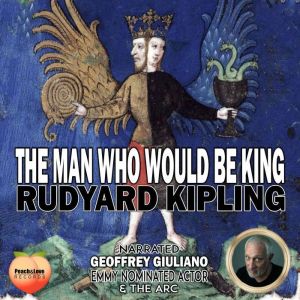
List: $15.00
| Sale: $10.50
Club: $7.50
The Man Who Would Be King
Author: Rudyard Kipling
Narrator: Geoffrey Giuliano, The Arc
Unabridged: 1 hr 49 min
Format: Digital Audiobook Download
Publisher: Icon Audio Arts
Published: 10/04/2023
Category: Fiction - Classics
Synopsis
"The Man Who Would Be King" is a novella written by British author Rudyard Kipling. It was first published in 1888 as part of Kipling's collection "The Phantom 'Rickshaw and other Eerie Tales." The novella is known for its adventure, exploration, and themes related to imperialism and cultural clash.The story follows the adventures of two British soldiers, Daniel Dravot and Peachey Carnehan, who have become disillusioned with their lives in the British Army stationed in India. They decide to leave the army and embark on a journey to the remote, fictional land of Kafiristan, located in the mountains of Afghanistan. In Kafiristan, they plan to establish themselves as god-like rulers and exploit the region's wealth and resources.Their journey is fraught with challenges, but the two men manage to impress the local people with their superior knowledge and advanced weaponry. They are hailed as gods and establish themselves as rulers. However, as time passes, their ambition, arrogance, and desire for power lead to a series of events that result in a dramatic and tragic conclusion."The Man Who Would Be King" explores themes of colonialism, cultural clash, and the consequences of unchecked ambition. It is a cautionary tale that illustrates the dangers of imperialism and the hubris of those who believe they can manipulate foreign cultures for their own gain.The novella has been adapted into various forms over the years, including a highly regarded 1975 film directed by John Huston, starring Sean Connery as Daniel Dravot and Michael Caine as Peachey Carnehan. The story's enduring appeal lies in its examination of the human desire for power and the consequences of attempting to subjugate foreign lands and cultures.